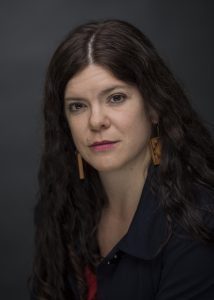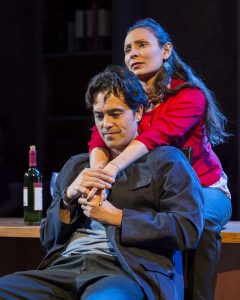In addition to being a playwright, Mary Kathryn Nagle is also a full-time lawyer. In May 2011, she was working on a major lawsuit for her then-law firm in New York City when a catastrophic tornado touched down in Joplin, Mo., where her parents lived. Catching the news on TV, Nagle looked up to see the hospital where her father worked for 30 years had been blown away.
That event would form the basis of her play Fairly Traceable, currently in its world premiere at Native Voices at the Autry (March 10-26). Nagle went home several times in the summer of 2011 to help her family dig out from the devastation. Her parents hadn’t always been cheerleaders of her playwriting career, she says, encouraging her to stick with law. But that summer, her father surprised her when he gave her a box back to take back to New York.
“He said, ‘I saved all the newspaper stories about everyone who died in the tornado,'” Nagle recalls. “‘I have every single story here, and I wanted to give it to you because I thought maybe someday you’ll write a play about it.’” That box contained the stories of 161 people, which became the basis of Fairly Traceable.

Born in Oklahoma and a citizen of the Cherokee Nation, Nagle studied theatre at Georgetown University and then environmental law at Tulane Law School. Having started at Tulane a week before Hurricane Katrina hit, Nagle expanded Fairly Traceable to incorporate several major environmental disasters, even extending the play’s timeline as far as the year 2042. Despite the futuristic climate-science angle, the resulting play, under the direction of Jon Lawrence Rivera, is described as a “romantic dramedy,” as it follows the entwining journeys of a young Ponca man, Randy, and Erin, a Chitimacha woman, as they balance personal and career ambitions with advocacy for the environment and the people they love.
“It is a very personal play to me,” Nagle says, before adding, “I guess you could say that about every play.”
It is also one of a number of plays Nagle has written that balance themes of Native identity with environmental advocacy. In 2014, 59E59 presented her Miss Lead, about a young Native American woman who discovers she has lead poisoning. A year before, as part of the Public Theater’s Emerging Writers Group, Nagle workshopped Manahatta, about a woman who moves from the Delaware Nation in Oklahoma to New York during the financial crisis.
Nagle first developed Fairly Traceable with the documentary theatre troupe the Civilians. But the play quickly became a natural fit for Native Voices, according to its producing artistic director, Randy Reinholz. Native Voices, which performs out of the Autry Museum of the American West, is dedicated to developing and producing new works by Native American. Within the past few years, Native Voices’ leaders noticed that they were being sent a substantial number of plays about the environment and climate change.
“We started reading more and more of these plays,” Reinholz recalls. “We thought we should put together a theme of taking back the land, of what we are doing as a modern society to the land, and have that as an organizing principle.”
And so Fairly Traceable is part of Native Voices’ 2016-17 season, which has been themed “Take Back the Land.” The main character Randy is an environmental law professor at the Louisiana university Tulane, but by the end of the play Tulane has had to move its campus to Baton Rouge because New Orleans is now underwater. Randy, who once defended oil companies, changed sides after suffering a personal loss.

“[Randy] is someone who doesn’t see himself as going out to change the world, and just because he’s Native he shouldn’t have to speak for all Native people,” says Reinholz. “And as he matures, he realizes that as an empowered adult he has to speak, he can’t sit on the sidelines.”
The title of Fairly Traceable refers to Justice Antonin Scalia’s written opinion for the majority in the 1992 Supreme Court case Lujan v. Defenders of Wildlife, a high standard for the burden of proof which Nagle argues “has been used repeatedly by federal courts to prevent climate change victims from holding those who profit from environmental destruction accountable.”
It’s a development that Oliver Houck, a Tulane professor specializing in environmental law, remembers discussing with Nagle early on in her law student days. “It’s a nasty trend in the law because it disenfranchises people,” Houck says.
Nagle isn’t the only former Tulane student who has pivoted between the law and theatre, but she is a notable example, Houck says. His experience with her work is personal: Nagle put Houck onstage when she was a student, giving him a sort of Our Town-like stage manager role in one of her plays. Houck regrets he won’t be able to see Fairly Traceable, especially since he’s heard that he shares a number of similarities with the play’s lead character. But he wishes his former student well.
“It’s not everyone who can live with feet planted so well in both worlds,” enthuses Houck. “She’s a terrific lawyer, a lawyer’s lawyer, and she’s also a terrific playwright.”
Nagle now splits her time between law offices in Washington, D.C., and Oklahoma, where the offices of Pipestem Law Firm P.C. are located—she’s a partner in the firm. To her, playwriting and law are actually more similar than one might think: Both jobs requires a good storyteller.
“If you can’t tell a story about your case, you’re going to lose, and whether that’s in a brief or in a courtroom in front of a judge, you have to be able to tell your story,” she explains. “I think they very much complement one another.”
Further informing her writing has been her work with the tribal leaders at the Standing Rock Indian Reservation, where for the last year, tribes and environmental activists have been protesting the Dakota Access Pipeline. In September Nagle co-authored an op-ed piece in The Boston Globe with Gloria Steinem on the connection between the oil pipeline and violence against Native women. Standing Rock has inspired an upcoming work, a commission from Portland Center Stage, that Nagle says will connect the stories of Lewis and Clark and Sacagawea to today’s Army Corps of Engineers and the pipeline.
Although Fairly Traceable was first written in 2013, Nagle said events like the pipeline protest and Donald Trump’s presidency (including his support for the pipeline) have only amplified the messages of the play—one of which is the importance of Native voices in the climate conversation.
“There’s a lot of talk about climate change right now, but we don’t often get to hear it from a Native perspective or hear Native people talk about climate change,” she explains. “And I think that’s really important, because our tribal nations here in the United States have been protecting Mother Earth and the land and the water since time immemorial.”


